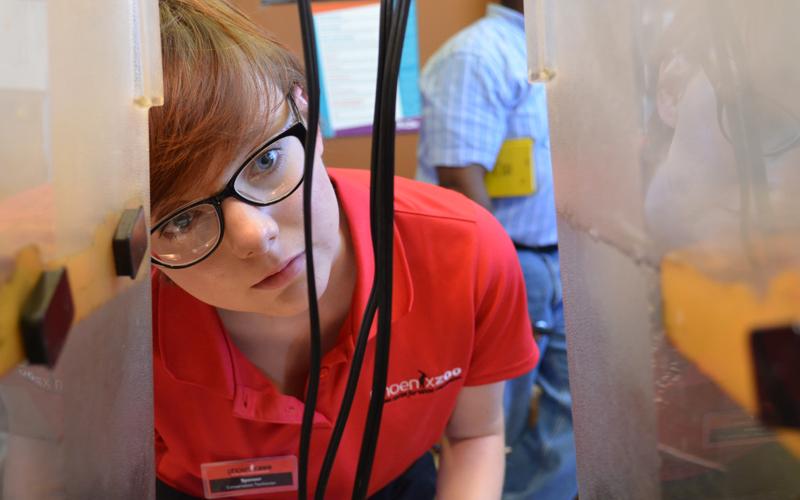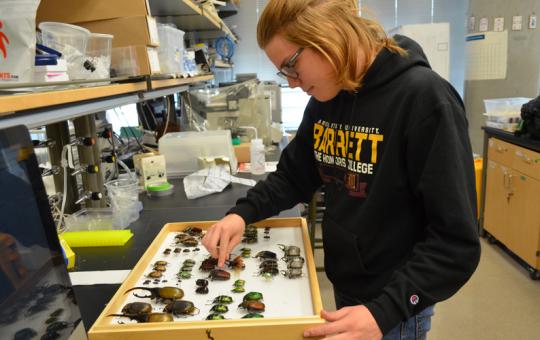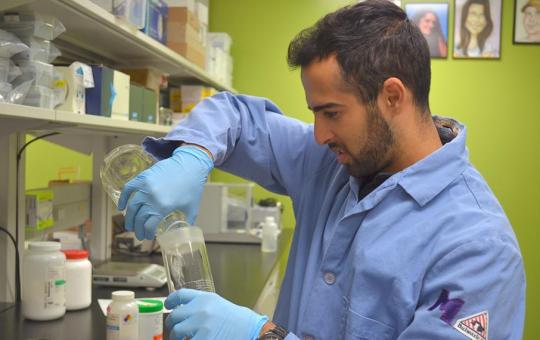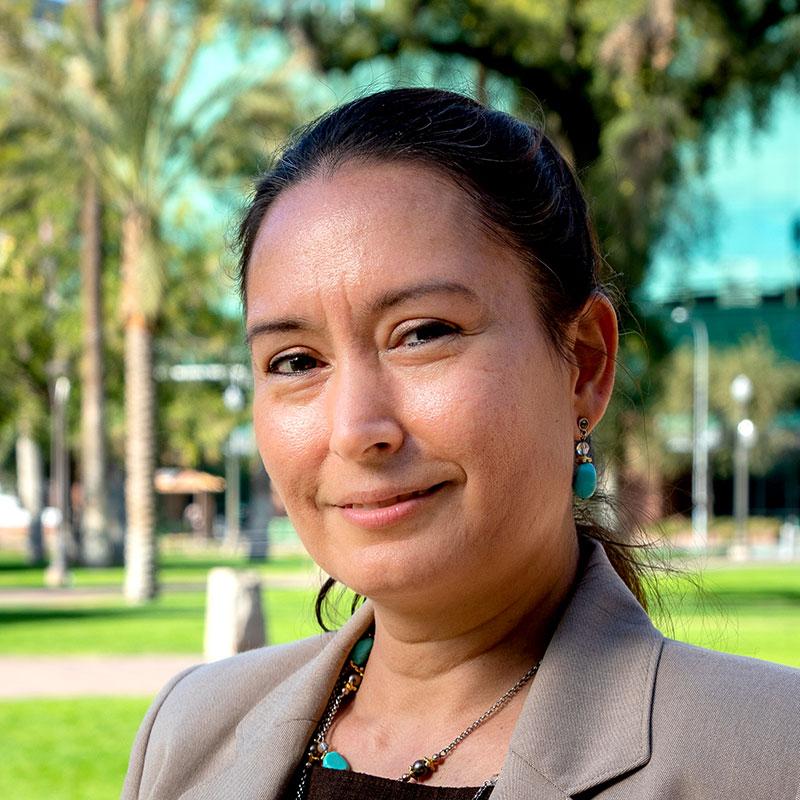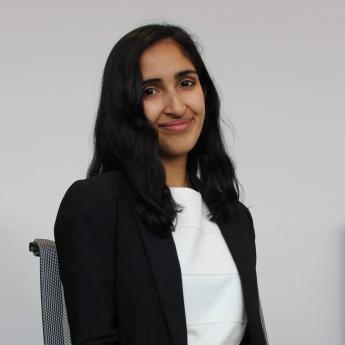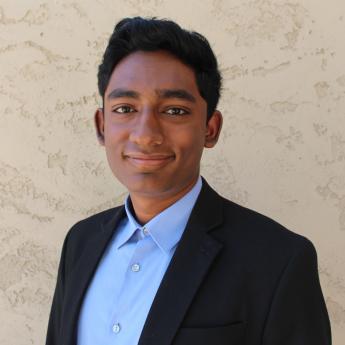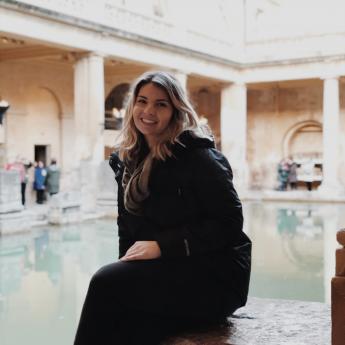
SOLUR
Undergraduate Research Program
Get involved in research
The School of Life Sciences Undergraduate Research (SOLUR) program promotes opportunities for undergraduates in the School of Life Sciences to participate in exciting biological research.
Working side-by-side with faculty and other mentors, we will teach you about scientific investigation through hands-on experiences. You will directly contribute to current research projects. Your research experience will help prepare you for a career in life sciences.
We provide:
- A community of mutually supportive undergraduate researchers.
- A seminar to foster your professional development and communications skills
- A poster symposium where you will feature your research and share your results
- Funding for students participating at the SOLUR Fellow and Scholar research levels
We encourage and promote research opportunities specifically for students within the School of Life Sciences. Our student researchers are often involved in interdisciplinary projects that encompass areas such as psychology, biochemistry, kinesiology, bioengineering, medicine and philosophy.
Learning research skills is a gradual process — so we offer four levels of student involvement: Apprentice, Researcher, Scholar and Fellow.
Apprentice
Apprentice
SOLUR Apprentice is a beginning level for undergraduate research and is for students who have little or no previous experience with a research project in the field or a lab. At this level, you will work for one or two semesters on a project largely developed, planned and guided by a faculty mentor.
Who qualifies?
All current undergraduate SOLS majors. Students with non-SOLS majors also qualify for the SOLUR Apprentice and SOLUR Researcher levels.
What will I do?
- Conduct short-term guided research
- Learn about scientific inquiry
- Search for and read scientific literature
- Work in the lab with a faculty mentor and grad students
- Participate in seminar classes with peer researchers
- Learn basic research skills
Requirements
- Enrolled as a full-time, degree-seeking ASU student
- Maintain a cumulative GPA of 2.75
- Either volunteer in a research lab or enroll in a research-credit course
The SOLUR program does not place students in research labs.Find a lab or faculty mentor. Or use Handshake to find open research lab positions.
Application and acceptance into the program
- Submit a completed SOLUR Apprentice Agreement Form
- Your faculty mentor will be contacted to sign the agreement form.
- Once received, we will review your information and grant an override to enroll in BIO 194.
- You will then enroll in the one-credit-hour SOLUR Seminar (BIO 194)
Note
Each mentor may consider several students for a research position. Mentors may ask you to submit additional materials or appear for a personal interview.
Researcher
Researcher
SOLUR Researcher is a high-beginning level for undergraduate research and is for students who have some experience with a research project in the field or a lab. At this level, you will work for one or two semesters on a project largely developed, planned and guided by a faculty mentor.
Who qualifies?
All current undergraduate SOLS majors. Students with non-SOLS majors also qualify for the SOLUR Apprentice and SOLUR Researcher levels.
What will I do?
- Conduct short-term guided research
- Learn about scientific inquiry
- Search for and read scientific literature
- Work in the lab with a faculty mentor and grad students
- Participate in seminar classes with peer researchers
- Enhance research skills
Requirements
- Enrolled as a full-time, degree-seeking ASU student
- Maintain a cumulative GPA of 2.75
- Either volunteer in a research lab or enroll in a research-credit course
The SOLUR Program does not place students in research labs. Find a lab or faculty mentor. Or, use Handshake(link is external) to find open research lab positions.
Application and acceptance into the program
- Submit a completed SOLUR Researcher Agreement Form.
- Your faculty mentor will be contacted to sign the agreement form.
- Once received, we will review your information and grant an override to enroll in BIO 289.
- You can then enroll in the one-credit-hour SOLUR Seminar (BIO 289)
Note
Each mentor may consider several students for a research position. Mentors may ask you to submit additional materials or appear for a personal interview.
Scholar
Scholar
Our mid-level undergraduate students generally have two to three semesters of research experience before preparing and submitting a SOLUR Scholar application. Many students were previously enrolled in BIO 289 SOLUR Seminar: Researcher when they started working in a research lab.
If you have research experience, we encourage you to apply at this level. If accepted, you will receive some financial support. All SOLUR Scholars are required to enroll in BIO 389 SOLUR Seminar: Scholar.
Who qualifies?
All current undergraduate SOLS majors qualify, including those transferring from community colleges who have two to three semesters of entry-level experience (SOLUR program, other lab or fieldwork).
What will I do?
As a paid SOLUR Scholar, you will work with a faculty mentor to:
- Conduct two semesters of guided research
- Design a research project with faculty assistance
- Search for and read scientific literature
- Engage in research-focused discussions
- Present your research at our annual symposium
- Receive funding from the SOLUR Program
- Participate in seminars and in the spring Poster Symposium
Requirements
- Enrolled as a full-time, degree-seeking ASU student
- Maintain a cumulative GPA of 3.0.
- Have at least two semesters of research experience
- Secure a commitment from a faculty mentor
Before you apply
- Talk with a faculty mentor about your research interest.
- Secure a commitment from a faculty mentor
- Need assistance? Contact us.
Application
We accept applications only once each year — in the early spring. Check due dates. Your application must include:
- Completed application form
- Statement of interest
- Resume that includes information on prior research experience
- Copy of your transcripts
- Letter of recommendation
- Commitment form
- Letter of support from a faculty mentor
Acceptance into the program
Funding is limited. We carefully review each application. You will be notified of your acceptance after the application period closes.
Fellow
Fellow
Our highest-level students generally have at least four semesters of research experience before preparing and submitting a SOLUR Fellow application. Many SOLUR Fellows were previously accepted as SOLUR Scholars.
If you have significant research experience and are ready to design research experiments in your current lab, we encourage you to apply at this level. If accepted, you will receive some financial support. All SOLUR Fellows are required to enroll in BIO 489 SOLUR Seminar: Fellow.
Who qualifies?
Full-time undergraduates, who, after their previous experiences (often as Researchers), now want to engage in the exciting and creative process of developing, testing and communicating their own scientific ideas and questions.
What will I do?
As a paid Fellow, you will:
- Conduct independent research
- Design and implement an independent research project with a faculty mentor
- Read and apply scientific literature to your own research
- Sculpt an understanding of scientific inquiry
- Engage in research-focused discussions
- Interpret and summarize your research findings
- Present your findings at our spring Poster Symposium
- Contribute 10 hours per semester to activities that broaden the impact of your research (community presentations, recruitment activities, etc.)
- Receive funding from the SOLUR program
- Participate in seminars
Requirements
- Be an undergraduate pursuing a SOLS major
- Maintain a cumulative GPA of 3.5.
- Be enrolled full-time at ASU
- At least one year or more of research experience. Fellows generally have at least four semesters.
Application
We accept applications only once each year — in the early spring. Your application must include:
- Completed application form
- Statement of interest
- Resume highlighting research experience
- Copy of your transcripts
- Two letters of recommendation
- Commitment form
- Statement of support from your faculty mentor
Acceptance into the program
Funding is limited. We carefully review each application. You will be notified of your acceptance after the application period closes.
Director's welcome
Welcome message
The SOLUR program mirrors SOLS mission “To inspire and transform life science students by providing an innovative learning experience that prepares them to thrive in a dynamic and demanding world”. SOLUR engages both in-person and online students in research and provides them with access to outstanding faculty mentors in the life sciences.
Our goal is that our undergraduate students, by participating in research, develop and improve their critical thinking and professional skills while joining a supportive community of peers and faculty across different disciplines.
Because we believe in the importance of research, we created the iSTEM SOLUR Prep course which has been designed to prepare undergraduates who are beginning their journey at ASU so they can become better candidates for research opportunities. By the end of the semester, 97% of these students declare an understanding of the research process and 10% of them have successfully joined a lab!
We think of SOLUR as a journey, whether our students join us after iSTEM SOLUR Prep, or as Apprentices or perhaps Researchers and then continue their journey as Scholars and Fellows, our aim is that they become better candidates for the next step in their career path. Currently, for example, more than 88 percent SOLUR program graduates are working in STEM jobs or enrolled in graduate, medical and professional school programs.
We are looking forward to partnerships with companies and foundations to support our program and to provide new opportunities for our outstanding researchers. Thank you for your support!
Susan Holechek, Ph.D.
SOLUR Director
SOLUR Seminar
The SOLUR Seminar serves as a professional development course for all participants. In a supportive community of undergraduate researchers, you’ll explore research practices, develop skills, and study ethics involved in research practices. You’ll expand your scientific writing and communications skills and hone your critical thinking.
While participating in this program, you'll sign up for one of the following courses according to what year you are in school and what level of research you are accepted into.
Courses include:
- BIO 189
- BIO 289
- BIO 389
- BIO 489
Spring 2021 Topics
- Exercising scientific ethics
- Research stewardship
- Scientific communication
By participating in research, our undergraduate scientists become better thinkers, innovators, and problem solvers. As part of this innovative research program, students will develop their critical thinking and professional skills and join a community of mutually supportive scientists.
Frequently asked questions
What is SOLUR?
SOLUR stands for School of Life Sciences Undergraduate Research program, which is a community of mutually supportive undergraduate researchers. As a member of this program, you can get involved in real-world research as an undergraduate student, whether you have no research experience, a little or a great deal.
How can I participate in the SOLUR Program?
If you are participating in a research lab already, you may enroll in BIO194 (SOLUR Apprentice level) or BIO289 (SOLUR Researcher level).
If you are not yet participating in a research lab, you will need to find one. Please see the "How do I find a research lab?" in this FAQ for more information.
If you wish to participate at the SOLUR Scholar or SOLUR Fellow levels, then you must wait until the application process begins which is typically every spring.
How do i find a research lab?
You can find a research lab one of two ways:
- Explore open research opportunities
- Contact a faculty mentor
Explore the ASU School of Life Sciences undergraduate research opportunities Handshake site for a list of available research opportunities.
However, this is not a complete list. Some faculty members accept student researchers even if they do not advertise specific positions. You might find this information on fliers or on the faculty member's web page.
Once you find a research topic you are interested in, search for a research mentor that aligns to your interest. Do some background reading about their research. Check out their lab website and recent publications. Then contact the specific faculty mentor regarding possible opportunities in their lab.
When contacting a potential faculty mentor, consider the following tips from the Annals of Medicine and Surgery:
- Use proper formatting and email etiquette
- Attract the faculty mentor with an informative and clear subject line
- Introduce yourself and show your interest in their field
- Attach your CV or resume
- Talk about your experience and commitment to research
How many research levels are there and how do they differ?
There are four student research levels based on your individual amount of research experience.
- SOLUR Apprentice: Semester-by-semester (fall and spring) opportunity for students with little to no prior research experience.
- SOLUR Researcher: Semester-by-semester (fall and spring) opportunity for students with a small amount of prior research experience.
- SOLUR Scholar: School of Life Sciences undergraduates who have two semesters or more of research experience. These students are eligible to receive funding for one academic year (funding limits subject to change).
- SOLUR Fellow: School of Life Sciences undergraduates with at least two years of research experience and high levels of diligence and commitment. Fellows are eligible to receive funding for one academic year (funding limits subject to change).
How will participating in research benefit me?
You can explore your interests and abilities in the life sciences and be part of a close-knit community on campus. You’ll build your research and communications skills and gain experience in the field or a lab. You could be promoted to a higher level of student researcher.
Will you place me in a research lab?
No, SOLUR does not place you in a research lab. However, you can search for a lab to work in on your own. Read our tips on how to get started.
Will I earn course credit for doing research?
Yes! You can volunteer in a lab without course credit or you can get credit by enrolling in BIO495 or 499. Either way, you are eligible to participate in the SOLUR Seminar BIO194 (SOLUR Apprentice level) or BIO289 (SOLUR Researcher level)
When do applications for the higher-level SOLUR Scholar and SOLUR Fellow research positions open and close?
Each year, applications open the first week of February and close in late March or early April.
What are the entry requirements for SOLUR Apprentices and SOLUR Researchers
You must be enrolled as a full-time, degree-seeking ASU student; 2.75+ GPA; already working in a research lab.
What are the entry requirements for SOLUR Scholars?
You must be enrolled as a full-time, degree-seeking ASU School of Life Sciences student; 3.0+ GPA; two or more semesters of research experience (SOLUR program, other lab or field-work)
What are the entry requirements for SOLUR Fellows?
You must be enrolled as a full-time, degree-seeking ASU School of Life Sciences student; 3.5+ GPA; two or more years of research experience (SOLUR program, other lab or field-work); already working in a research lab.
How can I find a research mentor and a lab to work in?
To search for a mentor, please visit the “Find a Mentor” link on the left side of this page and search by the research expertise you are interested in. Then, do your research on the work in each professor’s lab. Contact them individually to see whether they are accepting undergraduate students in their lab.
How can I find life sciences undergraduate research opportunities?
Create a Handshake profile(link is external) and begin searching for open opportunities.
What is the SOLUR Program Seminar (BIO 194/289/389/489) and how can I enroll in it?
The SOLUR Program Seminar is an integral part of your SOLUR experience. Each semester, we will cover a variety of topics important to your development as a scientist.
If enrolling at the SOLUR Apprentice or Researcher levels, please complete the SOLUR Apprentice/Researcher Agreement form(link is external). Once we have received the completed and signed form from your faculty mentor and review your information, we’ll contact you about enrolling in BIO 194/BIO 289.
If enrolling in BIO 389 or BIO 489, simply enroll in the course at your convenience. An override is placed on your record upon acceptance into the program.
What can I expect to get out of the SOLUR Seminar?
You’ll be learning to write scientifically and communicate your research to the general public. You’ll also create a research poster, develop your presentation skills, develop your CV and work on your own professional development. And importantly, you’ll receive individual and group guidance from the SOLUR Director, professor Shelley Haydel.
Can I volunteer in a research lab?
Yes! Many SOLUR Apprentices and Researchers are lab volunteers. Once you’ve found a research lab, please complete the agreement form.
Can I earn research credit AND be part of SOLUR?
It depends. SOLUR Apprentices and SOLUR Researchers are encouraged to earn credit for their research activities. Please speak with your SOLS advisor and PI about enrolling research credit courses (i.e. BIO/MBB/MIC 495), as enrolling in this course is at your PIs discretion. You will work with them to establish requirements that are reflective of a 400-level, upper-division class. SOLUR Scholars and SOLUR Fellows are being funded by SOLS for their research project. As such, they are not eligible to enroll in research credit courses (i.e. BIO/MBB/MIC 495). If a SOLUR Scholar and SOLUR Fellows wish to take BIO/MBB/MIC 495, please consult with SOLUR personnel.
